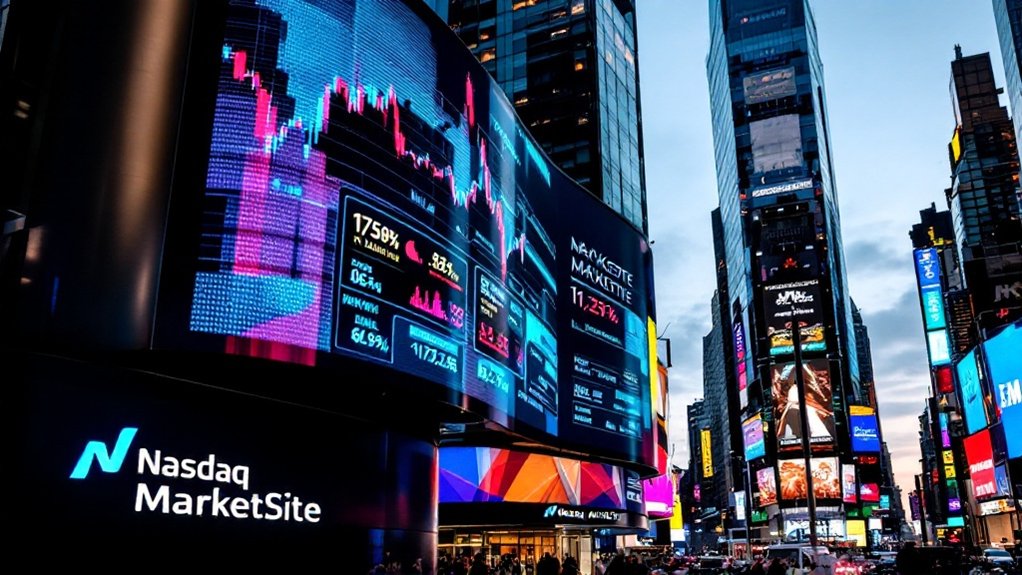The Nasdaq is a powerhouse electronic stock exchange that revolutionized trading by ditching the traditional trading floor for computers back in 1971. It’s now the world’s second-largest exchange, listing over 5,000 companies worth more than $19 trillion. Tech giants flock to this platform, making it a tech sector goldmine. The exchange operates globally, from America to Scandinavia, with its high-tech systems powering markets in 50+ countries. There’s more to this trading titan’s story.

The Nasdaq stands as a technological titan in the world of stock trading. Born in 1971 as the National Association of Securities Dealers Automated Quotations, it revolutionized the financial world by becoming the first-ever electronic stock exchange. No trading floor needed. No shouting traders. Just pure digital efficiency.
This massive marketplace now lists over 5,000 companies and boasts a mind-boggling market capitalization exceeding $19 trillion. That’s trillion with a T. It’s the second-largest stock exchange globally, and boy, does it love its tech stocks. Think of Nasdaq as Silicon Valley‘s favorite playground, where tech giants and innovative startups come to play. The exchange offers investors powerful compound returns through reinvested dividends over time.
The exchange operates across multiple continents, from the U.S. and Canada to Scandinavia and the Baltics. It’s structured in three tiers: Global Select, Global Market, and Capital Market. Companies wanting to join the club must register with the SEC and maintain at least three market makers. Under the leadership of Adena Friedman, who became CEO in 2016, Nasdaq made history as the first major U.S. exchange with a female chief executive. The exchange significantly enhanced its market presence when it opened its MarketSite headquarters in 2000.
The good news? Listing fees are cheaper than the NYSE. The timeline? A speedy four to six weeks.
Nasdaq’s claim to fame isn’t just its size – it’s its tech-heavy portfolio. The Nasdaq Composite tracks more than 2,500 companies, while the prestigious Nasdaq 100 features the biggest non-financial players. These indexes have become global benchmarks, like a financial weather vane for the tech sector.
The exchange’s technology is so impressive that over 50 countries use it. They were first to sell their tech and store records in the cloud. Trading happens around the clock, with pre-market, main market, and post-market sessions. No coffee breaks here. Just continuous, electronic trading through competing market makers.
Nasdaq never sleeps, powering global markets with cloud technology and round-the-clock trading through its revolutionary electronic system.
Performance-wise, Nasdaq’s tech-heavy lineup means more volatility – but it’s also delivered impressive long-term returns. The exchange keeps growing, driven by technology and consumer services sectors.
In the world of stock exchanges, Nasdaq isn’t just playing the game – it’s changing it.
Frequently Asked Questions
How Do International Companies Get Listed on the Nasdaq?
International companies must file Form 20-F with SEC, provide three years of audited financials under GAAP/IFRS, meet minimum equity requirements, and comply with Nasdaq’s listing standards and corporate governance rules.
What Are the Minimum Requirements for a Company to Join Nasdaq?
Companies must meet specific standards including minimum market capitalization of $550-850 million, stockholders’ equity of $55 million, public float of 1 million shares, and 300+ shareholders.
When Does the Nasdaq Market Open and Close?
The Nasdaq market operates Monday through Friday from 9:30 AM to 4:00 PM EST. Extended hours include pre-market trading (4:00 AM-9:30 AM) and post-market trading (4:05 PM-8:00 PM EST).
How Does Nasdaq Differ From the New York Stock Exchange?
Nasdaq operates as an electronic dealer market through market makers, while NYSE uses an auction system. Nasdaq has lower listing fees, less strict requirements, and focuses on tech companies versus NYSE’s established firms.
Can Individual Investors Trade Directly Through the Nasdaq Exchange?
Individual investors cannot trade directly through the Nasdaq exchange. They must work through licensed broker-dealers who have direct access to execute trades on the electronic marketplace.





